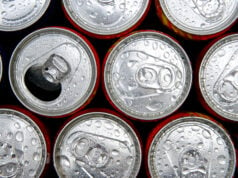
DEAR MAYO CLINIC: My husband has swapped out his regular morning coffee for an energy drink. Are these healthy options for getting his daily dose of caffeine? Do energy drinks have more caffeine than regular coffee? And how much caffeine is too much?
ANSWER: People love their caffeine, whether it’s coffee, tea, soda or energy drinks like your husband. It’s the most common stimulant in the world, and about 90% of all adults consume caffeine in some form every day. Many different caffeine options and flavors are readily available at coffee shops, restaurants, grocery stores and convenience stores. Energy drinks, in particular, are packaged in bright cans and have exciting names.
Caffeine is big business as well. The total global sale of energy drinks alone reached $57 billion in 2020. Energy drinks are the second-most popular dietary supplement among U.S. teens and young adults behind multivitamins.
Caffeine’s health effects vary from person to person and depend on the dose. It’s been shown to improve vigilance, reaction time, alertness and ability to concentrate. It can help alleviate the adverse effects of sleep deprivation. Caffeine intake also is associated with a reduced risk of Parkinson’s disease, Alzheimer’s disease, alcoholic cirrhosis and gout.
However, caffeine intake also is linked with nervousness, insomnia, irritability and panic attacks. Those with preexisting anxiety disorders may be more susceptible to these effects. Caffeine can temporarily raise blood pressure, and a high intake has been associated with mild increase in cholesterol levels.
Check the caffeine amount in your husband’s energy drink. Up to 400 milligrams of caffeine per day is considered safe for most adults. Most contain 100–300 milligrams of caffeine per serving, while home-brewed coffee contains 80–100 milligrams of caffeine per serving. Of course, these amounts can vary. If his preferred energy drink has 210 or more milligrams of caffeine per serving, consuming more than one per day would place his intake over the recommended level.
Excessive caffeine intake, more than 400 milligrams per day, can cause palpitations, tremors, agitation and gastrointestinal upset. Heavy caffeine use also is associated with an increased risk of other addictive behaviors, like smoking and alcohol abuse. People who routinely consume caffeine may develop physical and psychological dependence, and may they experience withdrawal symptoms if intake is abruptly stopped.
Another ingredient to review in his energy drinks is sugar. Many can contain significant amounts of added sugar or other sweeteners. High intake of added sugar can contribute to a variety of health problems, so the Dietary Guidelines for Americans recommends limiting the intake of added sugars to no more than 10% of total daily calories.
If your husband follows a 2,000-calorie diet, no more than 200 calories per day should come from added sugars. This is about 12 teaspoons a day. One 16-ounce can of some energy drinks can contain as much 210 calories and 47 grams of added sugar, which is equal to roughly 12 teaspoons. This is an entire day’s worth of added sugar.
Energy drinks aren’t all bad, though, especially when consumed in moderation. Some contain vitamins, minerals and amino acids. Others contain herbal supplements, such as ginseng and guarana, which may be used to increase energy and mental alertness. Use caution with these substances, as research on safety and effectiveness is limited. Also, some herbal supplements can interact with medications, so seek input from your husband’s health care team if he takes prescription medications.
It’s important to note that people who are pregnant or breastfeeding should limit their caffeine intake to 200 milligrams or less per day. The Food and Drug Administration has not set a safe level for children, but the American Academy of Pediatrics discourages the consumption of caffeine and other stimulants by children and adolescents. — Jamie Pronschinske, R.D.N., Dietitian, Mayo Clinic Health System, La Crosse, Wisconsin
Related Articles
- The buzz on energy drinks published 10/4/22
- Mayo Clinic Q and A: Caffeine’s effects on blood sugar and blood pressure published 3/21/22
The post Mayo Clinic Q and A: Are energy drinks a healthy option? appeared first on Mayo Clinic News Network.
Disclaimer
The information contained in South Florida Reporter is for general information purposes only.
The South Florida Reporter assumes no responsibility for errors or omissions in the contents of the Service.
In no event shall the South Florida Reporter be liable for any special, direct, indirect, consequential, or incidental damages or any damages whatsoever, whether in an action of contract, negligence or other tort, arising out of or in connection with the use of the Service or the contents of the Service. The Company reserves the right to make additions, deletions, or modifications to the contents of the Service at any time without prior notice.
The Company does not warrant that the Service is free of viruses or other harmful components
This article originally appeared here and was republished with permission.












